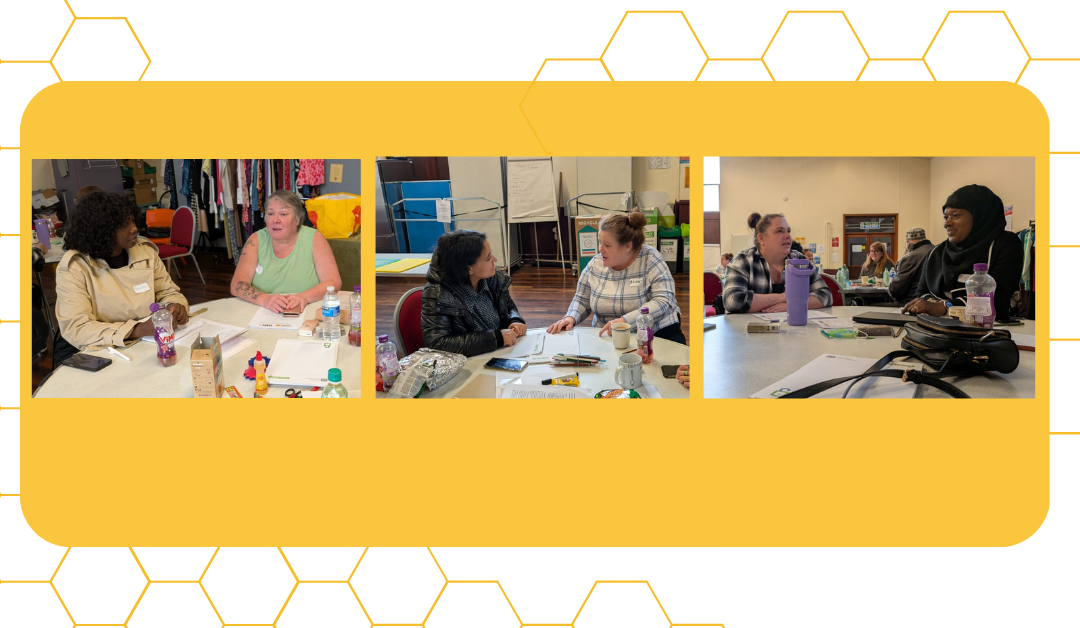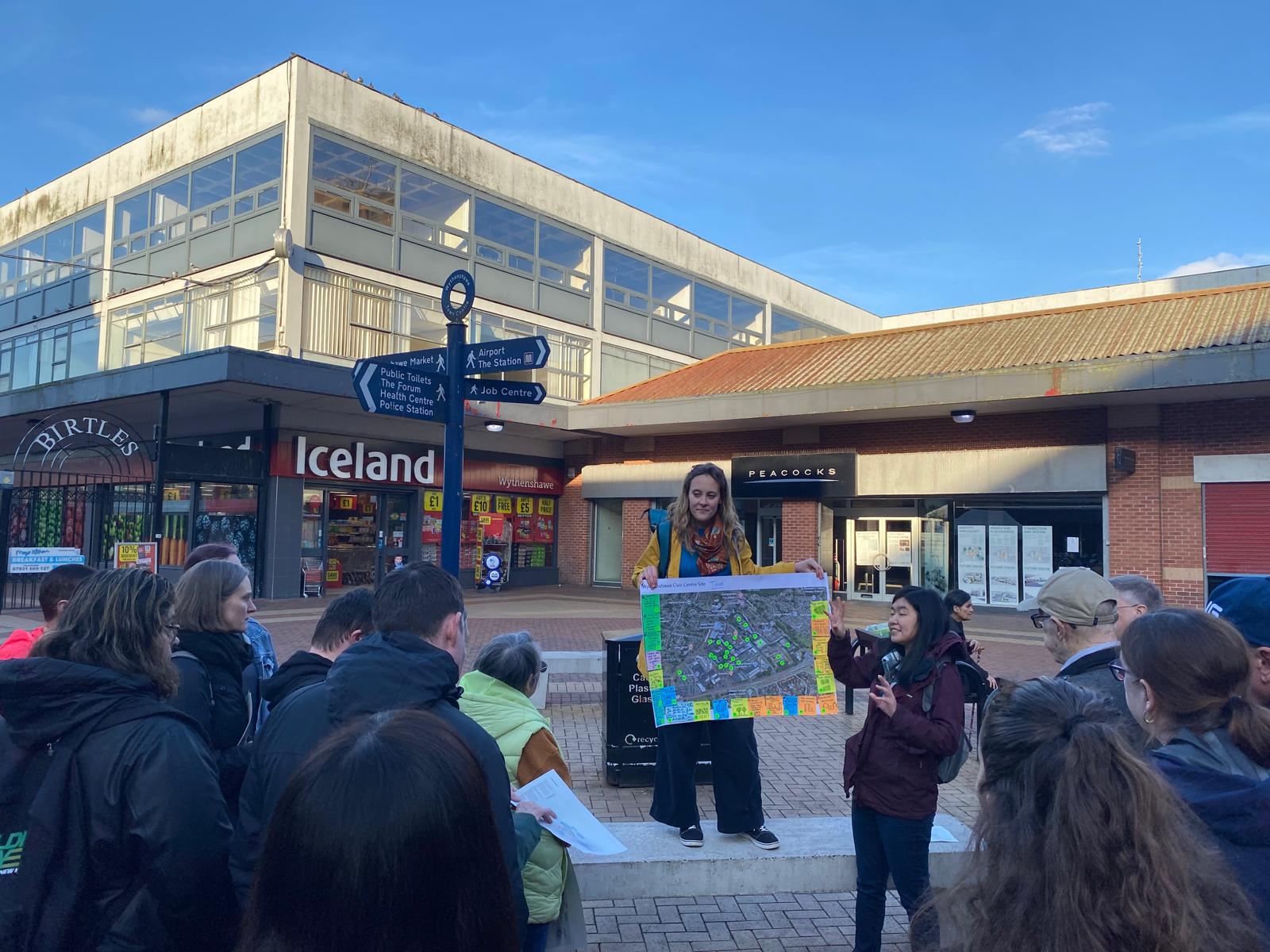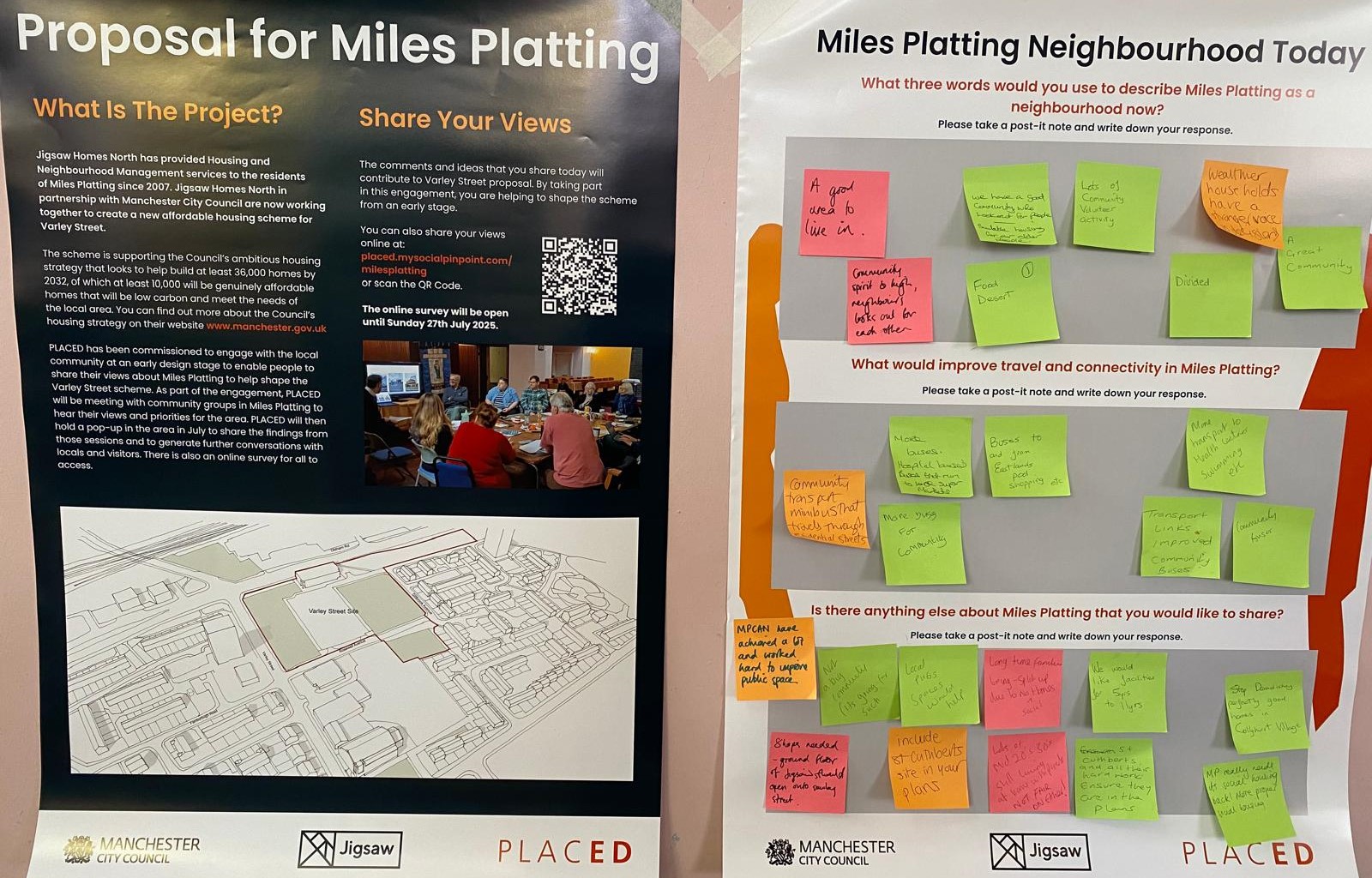Creating a NORC at Hopton Court

Hopton Hopefuls are the newest addition to the Community Savers family: a group of Over 50s tenants who have responded to the COVID-19 pandemic with resilience, mutual aid, and a good dose of wry humour, supported also by On Top of the World Hulme.
Since COVID struck, many older tenants have been isolated in their one bedroom flats with little support. Older people were already facing challenges of social isolation and fragmented and under-funded health and social care services before COVID happened, while also trying to make ends meet on pension credits. But as other agencies pulled back from face to face working, increasing pressure fell on informal community groups and mutual aid initiatives to meet people’s daily needs.
Despite the enforced isolation, tenants were able to make good use of the gardens over the summer, supported by On Top’s socially distanced drop ins, bingo sessions, and Get Busy on Your Balcony! And true to the history of tenant action in Hulme, the Hopton community responded to the COVID-19 crisis not by retreating but by re-organising: setting up a new tenants group and working with CLASS and academics at MICRA, University of Manchester, and at Manchester School of Architecture, on research that could bring older people’s experiences at Hopton Court to light.
Hopton Hopefuls are now working in partnership with One Manchester to co-produce a new initiative called a Naturally Occurring Retirement Community (NORC) at their tower block with five objectives:
- Re-instating
age-banding to Over-55s - Development
of age-friendly access and security systems - Age-friendly
adjustments to communal areas and older people’s flats - Recruiting
a new site-based Community Development Worker who can work hand-in-hand with
tenants to realise the NORC model - Developing
a new tenant-managed community space in the Hopton Court gardens
Hopton Hopefuls are now launching a background paper based on their research called Ageing Well in Place in Hulme which sets out the rationale for these objectives, in sometimes hard to read accounts of how older people have fallen through the gaps between health, housing and social care provision. These accounts set out the need for urgent action.
Read Ageing Well in Place in Hulme
Why “Ageing Well in Place”?
‘Ageing in place’ has become a popular policy term defined as ‘remaining living in the community, with some level of independence, rather than in residential care’. This approach is favoured by older people because it is seen to protect their autonomy, and connection to social support, including friends, neighbours and family. It is favoured also by policy-makers because it is seen to avoid or delay institutional alternatives and can therefore generate significant cost-savings across health and social care services.
However, there is also growing concern about the quality and appropriateness of housing stock to support ageing in place, and the need for significant levels of health and social care to ensure that quality of life of older residents is maintained ‘in place’.
Even though ageing in place can involve challenges, the evidence suggests that older people invariably have a strong emotional attachment to their familiar homes, and neighbourhoods and rarely wish to relocate in later life. Evidence for this has been reported across a range of environments, from inner-city areas to suburban and rural communities.
What is a NORC?
A number of approaches have been developed in response to the challenges facing people ageing in place, especially those living alone. Many of these have particular relevance to people living in low income communities. One idea – first developed in the mid-1980s in the USA – comes under the heading of a Naturally Occurring Retirement Community (NORC). A NORC is a term used to describe an age-integrated housing development or neighbourhood that originally contained different age groups, but which over time has become home to a concentration of older adults, 55 years of age and older.
New York has seen an extensive development of NORC programmes – often linked to high rise blocks with a large proportion of older residents. Typically, NORC programmes have been partnerships between a housing provider, its residents, and health and social service organisations collaborating to help older adults to age in place. The aim of the NORC is to
create opportunities for people to remain active in their community supported by, in the New York case, onsite social and health service supports and community-building activities:
‘Rather than just focusing on reacting to individuals in crisis – ‘one hip fracture at a time’ …the community itself plays an important role’ (Vladeck & Altman, 2015)
The NORC model is a good fit with the age-friendly approach pioneered in the UK by Manchester City Council. This model is also closely aligned with Manchester City Council’s recent emphasis on ‘Bringing Services Together’ at the neighbourhood scale which has been accelerated following the impact of COVID-19.
What can I do?
Hopton Hopefuls would like for the report to be read widely and to hear from anyone who has ideas or experiences to share that can help them on their journey to establishing Hopton as a pioneering NORC in Manchester.
Please contact sophiek.class@gmail.com to send feedback or to set up a meeting.
Ageing Well in Place in Hulme is co-authored by Tina Cribbin, Anne Finnegan, Mark Hammond and Christopher Philipson.
Happy IWD 2021!
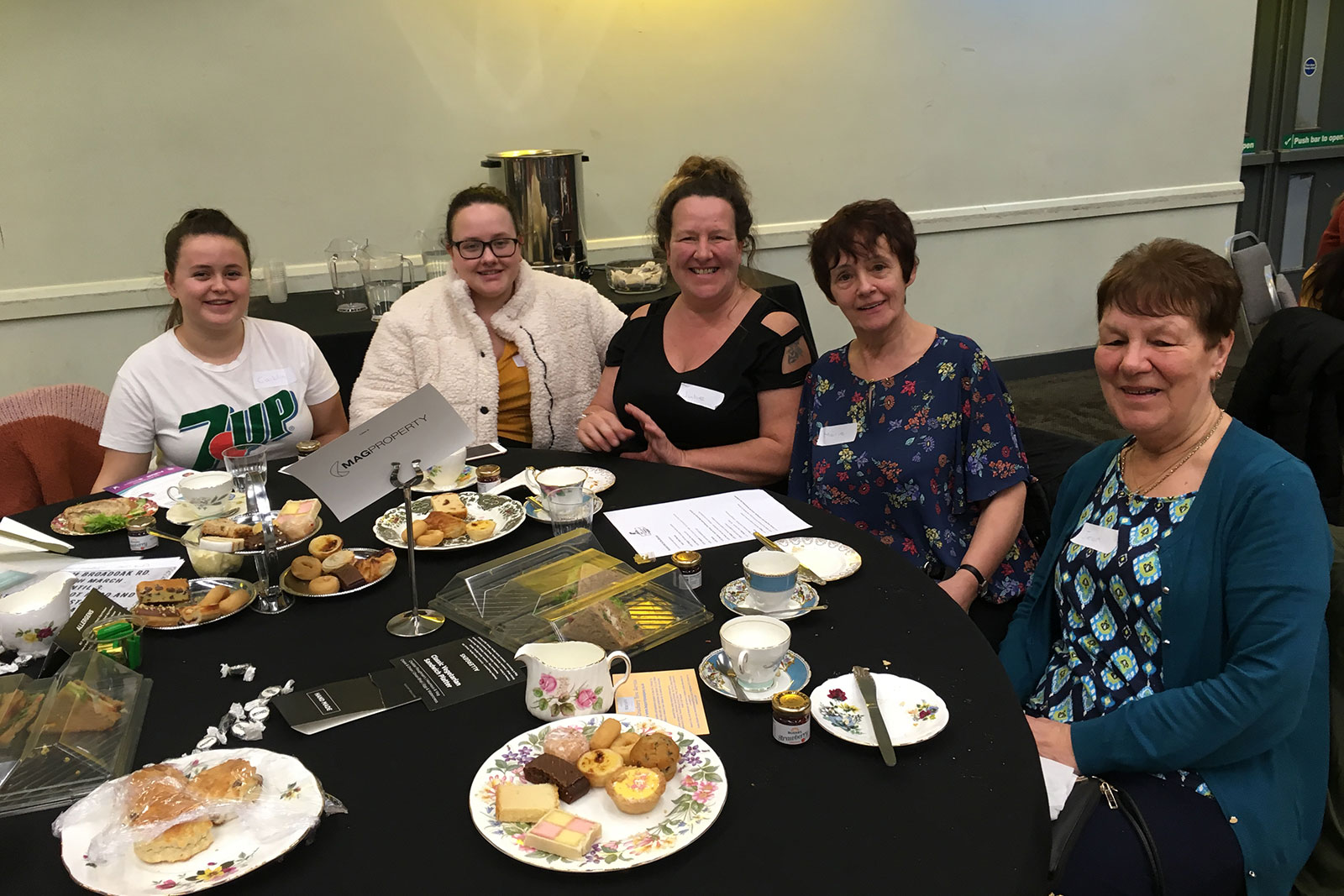
Jean is a 75 year old who has been isolating since March 2020. She is pictured above with her Mums Mart friends at an International Women’s Day celebration in 2018 so it seems fitting to celebrate her today together with the rest of the Mums Mart group.
Mums Mart is a women’s group that came together when a mum broke down in tears in the school playground one day exhausted from the stress of living on a low income as a single parent with no adult conversation for weeks at a time. Another parent brought her home for a brew and the ideas flowed from there – mums and families began coming together for Saturday evening meals at the local church hall, and then table top sales to raise money to take families away on day trips and weekends.
“Some of the kids had never seen the sea” says Sharon Davis, one of the founding members and Mums Mart Treasurer whose work to support women and families is being celebrated today at an online International Women’s Day celebration for Wythenshawe women and girls organised by Mike Kane MP.
Mums Mart is one of three women-led savings groups from the Community Savers network (together with Brinnington Savers and Sheffield Social Savers) who have been supported since January by the COVID-19 Frontline Women’s Fund managed by the Smallwood Trust who support women to overcome financial adversity and improve their social and emotional well-being.
Grassroots women’s organisations have had a critical role in supporting women and families throughout the pandemic. Elderly women like Jean, who has no family nearby and a number of health challenges requiring frequent visits to hospital, have been in desperate need of support from people whom they know and trust. Mums Mart have supported Jean throughout the period with food and basic necessities, lifts to and from hospital, and regular phone calls to keep her feeling connected and positive about the future.
But what does this have to do with savings? Sharon explains how Mums Mart became the pioneer for savings-based approaches from South Africa and Kenya in 2016 catalysing the Greater Manchester Savers network (soon to relaunch as Community Savers now a group has started up in Sheffield):
“When we first heard about savings we were an informal group of friends who were getting together every now and then to run a table top sale. We met with leaders from FedUp (Federation of the Urban Poor) and ISN (Informal Settlement Network) from South Africa and their savings approach really made sense to us. So we started up the first savings club as a Friday lunch club. Over time (working first with the University of Manchester and then with CLASS – our support agency) we developed our group so we had a constitution and bank accounts for our different activities, a membership process and a committee, and even our own members’ community fund. We visited South Africa and Nairobi to learn how they do things over there. We started doing community exchanges with other groups in neighbourhoods like ours around Greater Manchester and sometimes further afield like Glasgow and Sheffield. That’s how new savings groups have sprouted up.
There have been lots of developments since then. We are raising money locally to co-finance 10% of the cost of renovating a derelict flat into a women’s wellbeing space. Co-financing is something we learned about from savings federations in South Africa and Kenya. It means we have more of a stake in our community facilities and puts us in a leadership role.
The women in our group have grown in confidence and we have grown stronger together, we trust each other and share things with each other more than before. We look out for each other – we help families out when they are struggling and we try and bring women into the group who we hear about and think they might benefit. We started out with about five of us putting a pound away a week but now we have fifty members. People save for expensive times of year helping to avoid using credit cards or expensive loans, but the savings is just the glue. What we are really building is community.”
Well done to all the women leaders across the Savers network for your hard work and dedication in your communities throughout the last year!
Happy International Women’s Day 2021!
Go Digital!

Lorna Parks shares some reflections on her first few months as a digital inclusion volunteer with GM Savers through our Lottery-funded Go Digital! project
Just before Christmas I started working as a digital inclusion volunteer. With absolutely no experience of supporting people with technology, and by no means a tech expert myself I had no idea how this was going to go – but I was excited to get stuck into a new project.
Unfortunately, due to the latest lockdown, I found myself taking on the challenge of teaching digital skills digitally! Equipped with new tablets and laptops, community members have been getting stuck into our sessions over video calls with me. For a couple of hours every week I have been acting as a tour guide for programmes like Microsoft Word, Google Drive and Dropbox, showing off features and troubleshooting problems. This has involved having a little bit of patience with the technology, but most importantly having a laugh at the same time.
I have been working with members of the Miles Platting Savers group and have been fascinated to learn about the action they take to support their community. There is a real sense of community spirit, and a determination to learn digital skills and adapt to this increasingly virtual way of working. These digital skills sessions will enable the group to continue their work throughout whatever circumstances this year brings.
What have I enjoyed the most?
I have loved developing people’s skills, and enabling women community leaders to have the confidence to use laptops and tablets for both work and everyday things. I feel really proud of the progress the women I am working with are making, and happy to hear about them showing off their new skills to family members and other community savers members. One highlight has been one of my partners excitement on learning that she could type up new recipes on her laptop, and then look at them on the tablet when in the kitchen. The best way to get to grips with new technologies is getting stuck in, so being able to build up excitement around different ways to use it felt like a positive step forward.
What have I found the most challenging?
I felt challenged when the plan changed from meeting up in the community delivering sessions with social-distancing, to delivering them online. However, we have all risen to the challenge, and no zoom meetings have involved kicking people out, or any unkind standing orders (if you’ve missed it in the news, check out the recent Handforth Parish Council meeting!).
What would I say to others who might be thinking about doing this kind of work?
I would simply say – do it! As well as supporting others I have learnt a lot myself, and learnt loads about the work of different savings clubs across Greater Manchester. I have even done my first ever blog post!
Take away thoughts…
Digital inclusion could never be more important than it is now. I have learnt that offering support to someone struggling with aspects of their digital life can be a simple task with a big impact. Everyone is unique and has different digital needs – working at building skills together can increase confidence and knowledge for everyone involved!
Community Voice in Planning

This page contains materials from a seven-part community briefing series which took place between January and March 2021. Thanks to all the contributors and participants who made it such an interesting and engaging set of discussions. Some Zoom recordings have been edited to remove questions and discussion.
Session 7. Planning applications
In the final briefing of our series, Naomi Luhde Thompson (Rights: Community: Action!) shared her experiences of the end to end local planning application and decision-making process.
Zoom recording:
Session 6. Proactive approaches
Kat Wong (URBED) shared ideas about the different ways in which communities can be proactive about shaping how land, property and green spaces are used in their neighbourhood including neighbourhood planning, assets of community value and community asset transfer.
Zoom recording:
Session 5. Ageing well in place & 20 minute neighbourhoods
Sophie King (CLASS) shared ideas drawn from other recent talks and local experiments considering ageing well in place and Carolyn Kagan (Steady State Manchester) presented on the complementary concept of the 20 minute neighbourhood and how this is being put into practice around the world.
- 20 min neighbourhoods – slides for download
- Ageing Well in Place – slides for download
Zoom recordings:
Session 4. Affordable housing policy
Dr Richard Goulding (Research Associate, University of Sheffield) presented on a range of issues from housing trends in recent decades to levels of housing need, current affordable housing policy and the kinds of policy shifts that could support a higher level of affordable housing in Manchester.
- Richard Goulding – Powerpoint slides for download
Zoom recording:
Session 3. The Local Plan (5/2/21)
David Rudlin from URBED presented on the new five year development plan that is being written for the City of Manchester. We considered its implications for the kinds of developments that will be allowed in the City and in particular local neighbourhoods.
- David Rudlin – Powerpoint slides for download
Zoom recording:
Session 2. The Greater Manchester Spatial Framework (15/01/21)
David Rudlin from URBED and Mark Burton from Steady State Manchester presented to participants on the Greater Manchester Spatial Framework: What is the GMSF? What does it mean for Manchester? What does it mean for my local area? How does it link to other kinds of planning policy?
Further information and downloads:
Zoom recording (David’s briefing):
- David Rudlin – Powerpoint slides for download
Zoom recording (Mark’s briefing):
- Mark Burton – Powerpoint slides for download
Session 1. Permitted Development Rights consultation (08/01/21)
Hannah Berry from Greater Manchester Housing Action stood in for Naomi Luhde-Thompson from Rights Community Action and Friends of the Earth to explain the latest proposals to extend something called ‘Permitted Development Rights’ from the Ministry for Housing, Communities, and Local Government. The consultation deadline is 28 January 2021.
This first session was originally to be focused on local developments and the local planning process and this will be rescheduled for the end of the course.
Further information and downloads:
- Template letter for local leaders including links to further information about the proposals (also sent by email immediately after the session).
Digital inclusion, confusion and that Aha! moment

Tina Cribbin of Hulme Writers & Savers shares reflections on her digital skills-sharing sessions as part of GM Savers Go Digital! project – supported by the National Lottery Community Fund. Sessions are being run remotely through video call since the national lockdown was announced.
Just before Christmas, as usual, chaos reigned in the block. I felt overwhelmed with the number of crisis situations I was dealing with.
One resident who did not feel the need to “get involved in all that, its just not me”, phoned me in a state of crisis. I brought the tablet and set up our new Wi-Fi hub which was quite easy. We were quickly able to get the much-needed support she required.
In a crisis state, I didn’t push her to use the tablet, I just showed how it can be a useful tool. As things moved on, we worked on how to use the tablet as and when, for example, emailing agencies such as the benefits agency and social services. At first, she felt it was a hassle – I said “you need to trust me on this”.
We set up her email account and she sent her first email. When I showed her how it could be stored, she said “Aha I get it now! No-one can say I didn’t send it and them lot can’t mess me about!” I think she felt a sense of power for the first time where her life was being controlled by big institutions. This resident has so much stress and never gets any downtime, I showed her how to watch TV on it. “You mean I can watch stuff any time?” I said yes. That night she told me she watched the Housewives of Jersey but fell asleep after two episodes. I said “I’m not surprised” and we both laughed.
My other resident I’m sharing skills with is an older man, when I first brought the tablet into him he said “Get that thing out its neither use nor ornament!” I try and engage with him as and when. I know he loves reading, particularly Irish history. We ordered a book, and it came the next day. He was delighted. It was a picture history of his hometown, Donegal. Recently he’s had a tough time shielding and being very afraid of COVID 19. He received a letter of invitation to have the vaccine administered. The phone lines were impossible, so I was able to use our new tablet to book him in online. We got an appointment quickly and he said “It confuses me the way it works. But it does work!”
I’ve learned that older people are learning best when they learn by doing – when they gain something of importance to them about the engagement and for it to be very informal over a cup of tea. They also like it when I make mistakes on the tablet – the older man I noticed would then try and help me out with “What’s that button for? Could we try this?” and then a whole conversation would take place.
I am no expert and realise I am also learning by doing.
Manctopia: Reality TV in a journalism jumper*
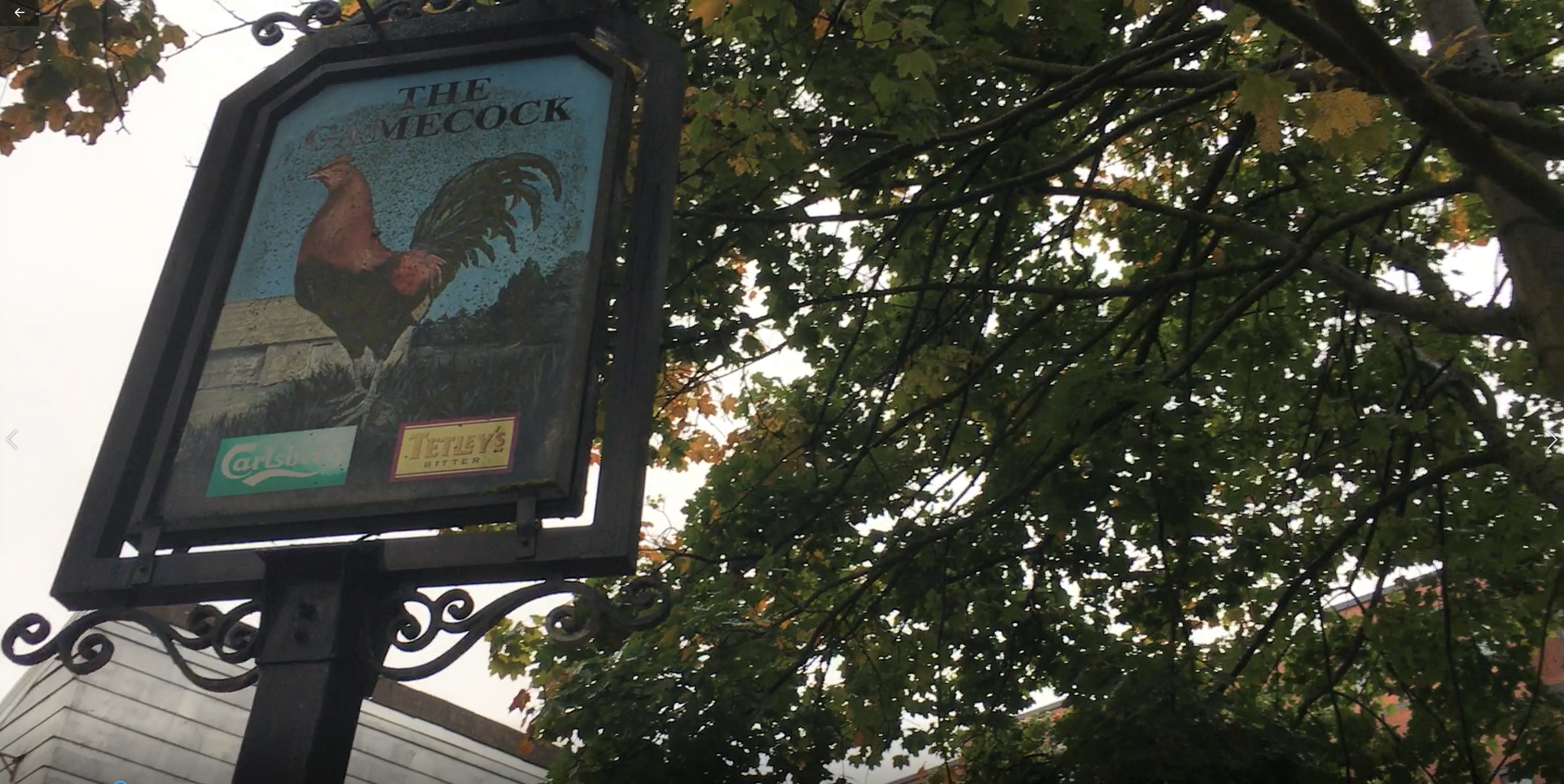
“We want Manchester to be this cosmopolitan city…but at what cost?” Judith from Lifeshare in the trailer for Manctopia
The series trailer and episode lead-ins for this 4-part BBC Two documentary that concluded on Tuesday evening are suggestive of a series seeking to analyse the inequalities associated with Manchester’s “property boom”. Instead, this glossy reality TV entrenches a misguided message that uncontrolled investor-driven urban development is the only possible trajectory. Its winners vs losers framing negatively impacts those communities experiencing the pressures of gentrification on a daily basis.
Greater Manchester Savers have contacted the BBC today about their concerns regarding the Minnow Films production ‘Manctopia’. Many tuned into the programme hoping to see some serious national journalism interrogating the underlying issues that are increasingly fragmenting communities, displacing people to outer areas of the city-region and beyond, and ultimately costing lives on the streets and through a mental health crisis.
This is not what they received. This article attempts to give voice to some of the key concerns and responses of members of inner city savings groups and their networks.
Throughout the series the audience is presented with a version of reality where investor-led urban development is the only available option for local and national government and society more widely. There is no analysis of what alternative strategies a city like Manchester can decide to pursue or of any of the challenges that may be present in the approach that has been taken to date. There is no discussion for example of Planning Obligations which provide an under-enforced mechanism through which local authorities can ensure that communities are compensated for developments and that negative impacts are mitigated. Neither is there any discussion of approaches that have been taken in other cities to avoid the profits from development being extracted out of the city instead of being made to work for the social welfare of people and communities most in need of support.
In episode three, some airtime is given to Mayor of Salford Paul Dennett who is at pains to stress the urgency for new build housing and that the City of Salford and the Greater Manchester Combined Authority have a vision for affordable housing. However, at no point is there any breaking down of what ‘affordable housing’ means in practice even when Paul Dennett tries to bring this out by talking about ‘genuinely’ affordable housing. In reality, the term is used to refer to three different types of housing provision: shared ownership, affordable rents (set at 80% of market rent), and social rent (which works out at approximately 60% of market rent). For many existing residents of the communities featured in the programme, only social rented accommodation is affordable.
Here, some of the members of the GM Savers network share their responses to the programme in person:
Tina Cribbin in Hulme talks about stigmatisation, the absence of alternative strategies presented, and the poor diversity of experience covered by the programme.
Roy Bennett in Hulme wishes the programme could have looked at the way that development happens without any plans being made for how to protect sufficient land for community facilities and appropriate housing for older people:
Sue, Dot and Christine in Miles Platting and Collyhurst discuss how the programme failed to represent the experiences and needs of households and families like theirs currently living in social housing or to educate us about the reasons for so much housing becoming privatised and unaffordable.
Thelma McGrail, who appears in the programme briefly, is concerned about having been provided with a misleading explanation of what the programme was going to be about, and the stigmatising portrayal of the Miles Platting community during the programme.
Ellie Trimble, local resident and Church of England Rector in Miles Platting, who was engaged by the programme makers but became worried about their approach, shares her concerns about the unrepresentative and simplistic presentation of homelessness and temporary accommodation.
People have shared how important it was that Anne and Donna and other local residents were able to raise the profile of experiences on the Osborne estate under the Northern Gateway regeneration process in the final episode. However, Greater Manchester Savers feel that ultimately, there was inadequate analysis of the local, national and international factors that are shaping the current housing crisis and resulting in people being displaced from the city. Some history was featured but without any unpacking of the reasons behind those histories. The community leaders who have commented feel that the repeated presentation of various (sometimes deeply offensive) individual perspectives, with no qualification or discussion, when dealing with issues of such critical importance to people’s physical and mental wellbeing, is unacceptable. They feel most strikingly that disproportionate airtime has been given to the perspective of a single millionaire developer and a number of unrepresentative caricature features such as that on the wealthy fashion designer who needs extra bedrooms for her shoes.
At a time of national crisis, when the effects of ten years of austerity policies have combined with an as yet uncontrolled pandemic to exacerbate poverty and health inequalities in some of the most hard-hit communities in the city (and the country), Greater Manchester Savers consider the airing of this series to have been misjudged and the nature of its directorial narrative to be misleading and unrepresentative. The suggestion that the main focus of the programme may not have been properly and clearly explained to some of the individuals interviewed (see Thelma’s contribution) is also concerning.
In their editorial guidelines, the BBC commits to:
- covering subject matter in such a way ‘so that no significant strand of thought is under-represented or omitted’
- ‘always scrutinise arguments, question consensus and hold power to account with consistency and due impartiality’
- ‘offering our audiences choices about how to confront’ [the issues they are covering within their programming]
Greater Manchester Savers question whether these guidelines have been adhered to in the making of Manctopia.
*‘Capitalists in Anarchist Jumpers’ is a poem by Tina Cribbin published in her 2019 collection Classphemy. This article has been written by Sophie King at CLASS in consultation with, and on behalf of, members of GM Savers and their local networks in response to concerns they have raised about the programme.
Its the little wins

Tina Cribbin celebrates recent achievements of local residents and members of On Top of the World in Hulme.
In our tower block there was always a sense of hopelessness with the tenants just having given up after years of making no impact upon where they lived no matter how they approached. An example: it took three years to get a bench for residents to sit on. When I think back to all the energy that took!
But after On Top of the World and CLASS began to work together we work differently. We have had lots of little wins like new benches, mobility charging points, support for our digital inclusion work, and now we are developing a partnership with our housing provider One Manchester to look at ways to provide supported accommodation for older people in Hulme. I realised the importance of where you take your concerns and how to negotiate – someone at CLASS said, sometimes, we have to create a space for professionals to help us. It’s really stayed with me because previously I would have just blamed the professional for not listening to us and giving us a hard time. These little nuggets are the things I’m soaking up for myself and, more importantly, for my community.
Recently we had a meeting with the Director of Place at One Manchester about supported accommodation and we mentioned the laundry facility in the block being closed and how this impacted on the tenants. She was quite open with us as we now have built a relationship.
The other day, Jack who is 81 came to me smiling – ‘well Tina’, he says, ‘the laundry rooms now open’. I said that’s great. Then he said ‘in our next meeting, what we must do next, is make sure we get a new washing machine!’
This may not seem much but after working with these guys for over three years it is the first time they felt that had the power to make an impact. And the belief that his voice will be heard. How do you measure that?
Since we started up our savings group, I’ve also been able to buy myself a new sofa – it’s the first time in my life I’ve ever bought a sofa new – it’s like I said in our ‘story so far’ report – I was never taught how to manage money because we never had any.
If I could sum up the benefits of working with CLASS as a member of the Greater Manchester Savers network, this would be it…
Change and giving voice to the voiceless.
Networks get stronger despite coronavirus isolation
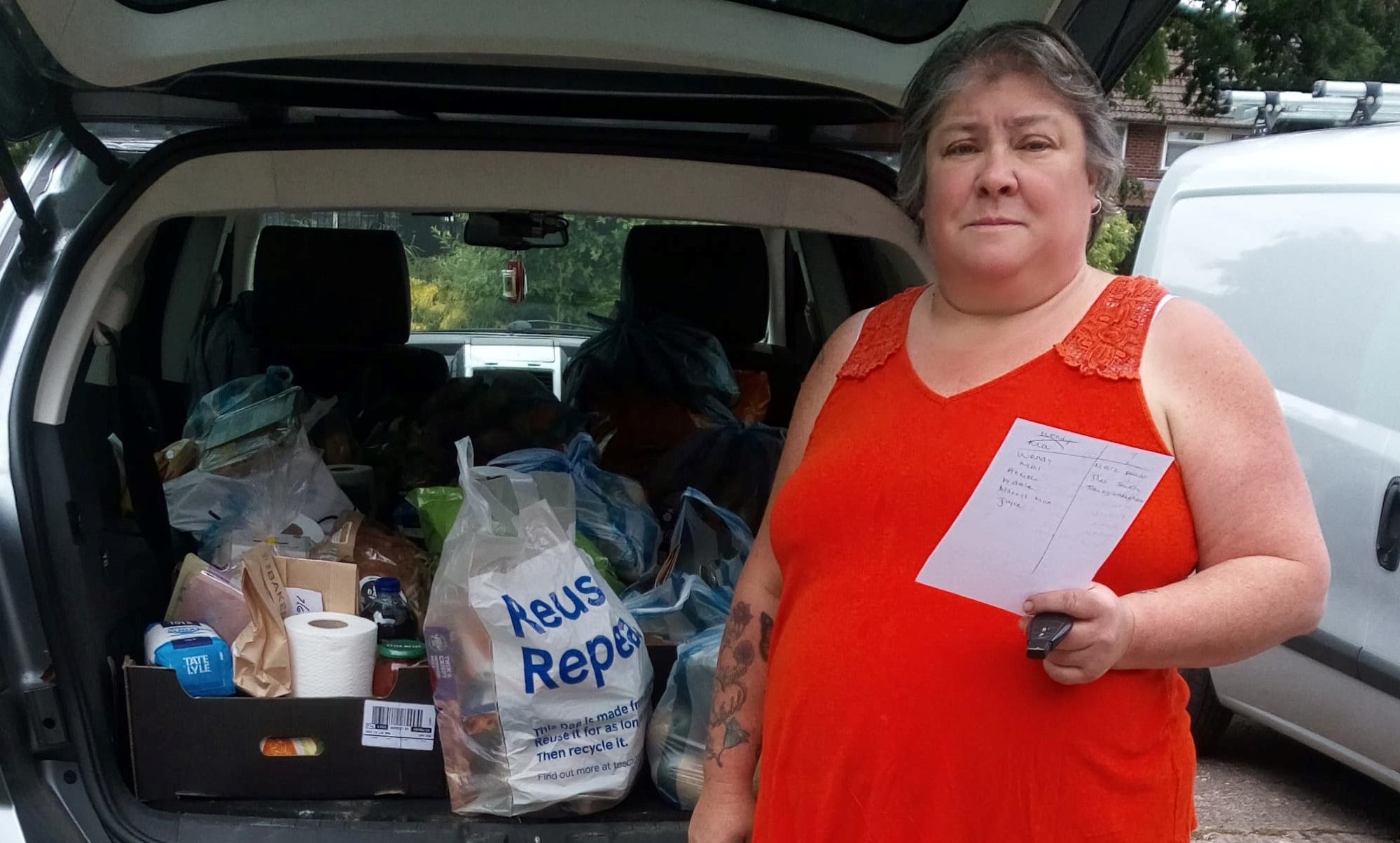
In the third of a series of articles looking at the experiences of some of our members during the pandemic, Rowena Harding asks Sharon Davis about the community response in Wythenshawe.
Wythenshawe is a connected community. It’s got numerous community centres, healthy cooking and food growing projects, a good neighbours scheme, and Mums Mart – a women-led community association running markets, lunch clubs and a savings scheme. So what has happened to the people who use and need those services as the coronavirus closed public spaces, restricted community meetings and forced people indoors to isolate? The community heroes who had been running those services are still there – they’re just finding new ways to reach out and connect.
Take Sharon Davis. She’s been the driving force behind the Mums Mart savings scheme in Wythenshawe and supported the setting up of new women-led savings groups in Brinnington, Hulme and Miles Platting. Mums Mart’s savings group meets in a community location, where a weekly lunch is also available. It’s through these activities that Sharon has come to know people in the area who may need help now the virus has forced them behind doors.
“Since lockdown, we have been identifying where people live and taking the food we get donated from Marks and Spencers,” Sharon explains. The group was able to access emergency community funding, so they had money to spend on essential items that weren’t donated.
“I think it’s been useful that we had our group,” Sharon said. “We’ve got phone numbers [for the savings groups members], and I speak to them often. We’ve got a few Facebook messenger groups and if anything goes wrong they call me. We have had people connecting with us on messenger, or I’ll see something on Facebook,” Sharon explains of a chance posting that led her to get dog food for a veteran with underlying health issues who shouldn’t be going to the shops.
She’s also been able to get nappies for parents who can’t go out and items for people who simply can’t afford it. Those in the community who lost jobs due to virus-related layoffs still have to wait six weeks for money to come through, and those who have been furloughed may be getting 80% of their salary paid by the government, but as Sharon points out, they still have 100% of bills to pay.
We hear the phrase “self isolating” so much in the COVID era, but Sharon says many can’t imagine the reality of isolation that people are going through. She talks of a woman in her nineties living alone, who’d love to give her a hug; a man in his eighties with Parkinsons who had not left his house for 14 weeks; and a family with three children in a middle flat, all at home together and not going outside. When Sharon went to drop off some food to one woman, she was told to keep it for someone who needed it more. This woman told her that what she was really struggling with was loneliness.
Sharon realised there’s also the potential benefit of having the large community space where they used to meet. She’s been doing refurb on the place while it’s been quiet, but when she heard this woman’s loneliness Sharon told her there’s plenty of space for her to come in and have a brew from a distance. As the lockdown begins to lift, the Mums Mart group will try and have a distanced meeting so they can reconnect in person.
It’s not just Sharon that is helping the community get what they need. Thanks to the initiative of another connected community member, Sharon now has a drop off point for bulk items that is also passed onto residents in that location. Sharon’s daughter Sian also joins her for the big shop and they store items to reduce the amount of times they need to go to the shops. Everyone is looking after each other, Sharon says. “In my opinion, people are looking out for their neighbours much more. Let’s hope it stays.”
Greater Manchester Savers: Our story so far

Explore any urban neighbourhood in Greater Manchester – seek out its craft groups, its over 50s exercise classes, its food banks, parent groups, and meal clubs – and there you will find amazing women.
We call them Women Warriors: the lynchpins of communities that have experienced decades of economic, social and political disadvantage, communities where the Greater Manchester Savers operate.
Women have always played a critical role in community action in the UK (and across the world). Since the onset of austerity policies in 2010 which has reduced spending on public services and social support, women have been at the forefront of the battle to provide a safety net for the most vulnerable in our society. Most of the time they are also struggling with challenging personal circumstances of their own.
The gendered nature of this community action usually goes unrecognised. It is almost always unpaid, and the cost of activities are frequently shouldered by communities themselves.
Women’s integral role in holding communities together against forces that impoverish and fragment them gives them astute insights into local aspirations, challenges, and motivations. Yet, such women are some of the least likely to have influence over the decisions that are made about their community. Places, in the context of Greater Manchester, where they and their families have often lived for generations.
This is a story of women-led change.
The booklet we are launching today takes stock of what Greater Manchester Savers have achieved so far, experiences of our members over time and the partnership support Savers would welcome, and why our approach matters amidst such challenging times.
Our network has emerged following a series of community exchanges between women engaged in poverty action in Greater Manchester and activists from South African and Kenyan affiliates of the international social movement Shack/Slum Dwellers International (SDI). It was enabled by an action research project funded under the Mistra Urban Futures’ Realising Just Cities programme (University of Sheffield) between 2017-2019. This work also draws on earlier and continuing support from the Global Development Institute (University of Manchester) and its collaboration with SDI, particularly within its teaching programme.
Most importantly, Greater Manchester Savers has been catalysed by the willingness of SDI activists in the Global South to share their histories and experiences; and by longstanding women community leaders in Greater Manchester who have brought their own experiences into this process and made it their own.
GM Savers and COVID 19
As this publication was nearing completion the world was struck by the Coronavirus pandemic. The speed with which under-resourced community groups have organised to ensure basic needs are being met in their neighbourhoods is testament to the critical role they will necessarily play in what is likely to be a turbulent future.
Together with the stark health inequalities between deprived and affluent neighbourhoods revealed by the pandemic in England and Wales, this has strengthened our belief that our work is becoming ever more important amidst mounting and multiple economic, social and environmental crises.
Read about some of our members responses to COVID 19 in Miles Platting, Hulme and Wythenshawe.
Throughout 2020 Savers are focused on adapting to the rapid changes facing their communities. We are currently learning from our sisters in Nairobi who have been busy setting up local COVID 19 monitoring committees.
GM Savers is supported by Community Led Action and Savings Support (CLASS), which provides professional support to affiliated savings groups. We are also grateful for the support of the Urban Institute at the University of Sheffield and the Global Development Institute at the University of Manchester.
Looking out for each other during lockdown
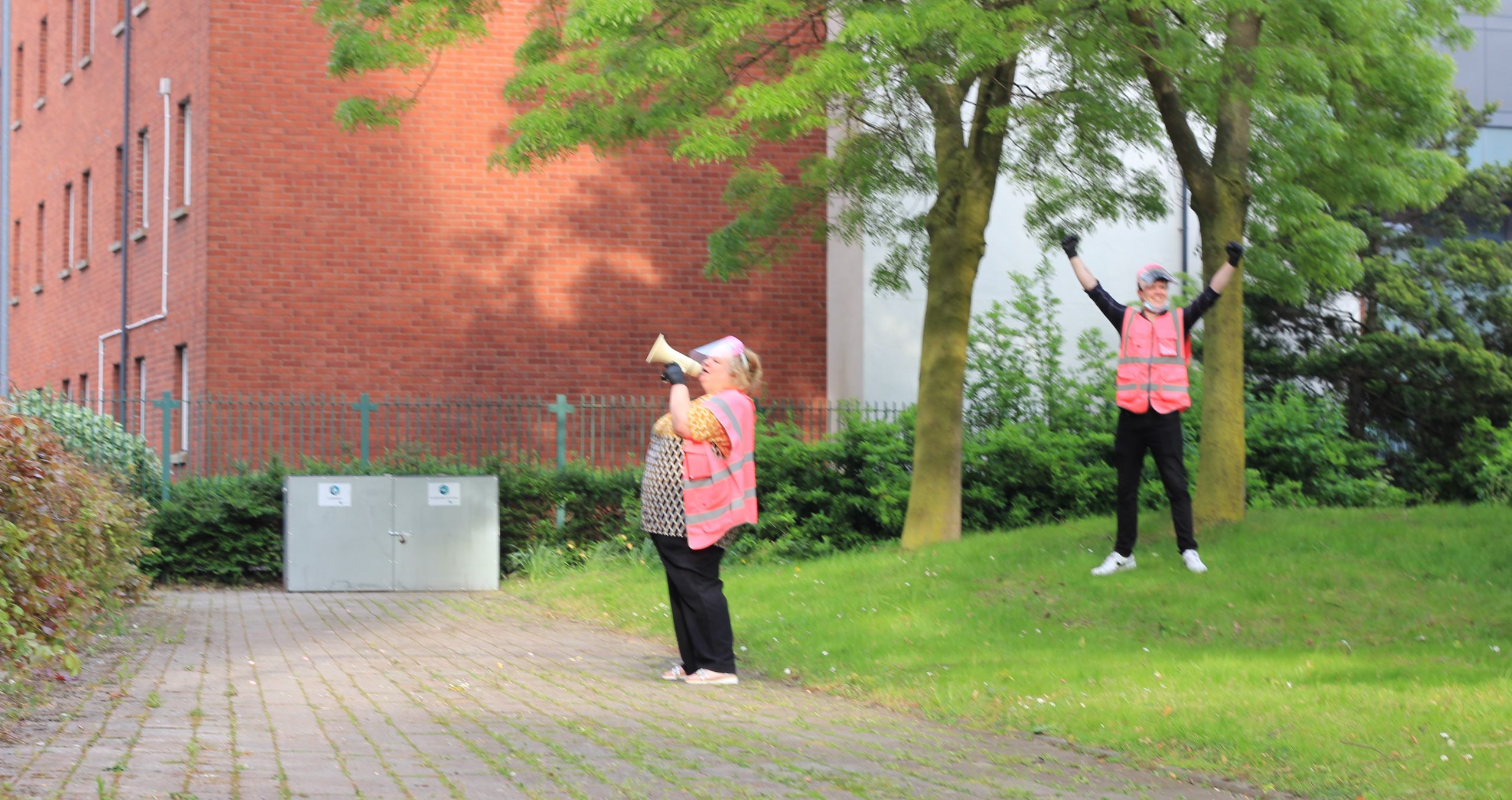
In the second of a series of articles looking at the experiences of some of our members during the pandemic, Rowena Harding asks Tina Cribbin about On Top of the World and life under lockdown in Hulme.
Living in a tower block in Hulme has challenges. Gentrification is disrupting the neighbourhood, the University’s students means transient neighbours, development takes away community spaces, and the findings of the Grenfell inquiry compound to make residents feel like sitting ducks in their high-rise homes. So when the coronavirus pandemic meant residents needed to “stay safe, stay home” it was clear that something was needed to keep spirits up.
“There are many ways to die,” said resident Tina who is part of On Top of the World, a community group based in Hulme, who use arts and creativity to reduce isolation and promote wellbeing among older people. “We had to do something before people’s mental health deteriorated.”
And so, Get Busy on Your Balcony was born which saw Tina and her co-workers Anne and Chris dancing and singing “I just called to say I love you” up to the residents of Hopton Court in Hulme much to the amusement of passing bus drivers. People sing along from their balconies and enjoy Balcony Bingo with other activities including boredom packs with jigsaws and sunflower planting.
On Top of the World are now moving on to organise events like Social Distance Disco which Tina says “give people joy and hope, and nourish the soul.”
It helped that On Top of the World and residents like Tina already had an active presence in the community. “We’d done the groundwork. We’ve had drop ins, Irish storytelling cafes, and dances. Creative writing sessions where we run our savings group and drama, circus skills and a DJ,” Tina described, in life before lockdown. She said that when they started organising the events and pushing bingo cards through people’s doors “they knew we were going to do something daft!” Tina said it’s this kind of presence in the community that’s so important to community engagement – not just during the pandemic. “Success is knowing the community. You have to know what your community needs. You have to have empathy and know the history of isolation and injustice. And the history of the people.”
Tina and the team provide practical help as well as the laughter and singing because the usual challenges of life are still going on in lockdown. “We help with advocacy, food parcels, we make sure people get medicine, if they needed crisis support with money when someone had been broken into. Older people were coming out of hospital with no-one providing care for them”.
The residents have also made a real effort to connect with each other especially people who are not digitally included. “The biggest thing we’ve done is the daily ring round. The conversations have been harrowing. We had a lady whose voice went because she had not spoken to someone for so long. [Another lady] crying down the phone line in isolation and then apologising for crying. [One gent] who had not seen his grandkids for so long and told me ‘it’s worse than the war; at least I could see people.’”
Tina explained that the residents wanted to let everyone know they had not been forgotten. She also describes that they had to work hard to make sure the fear of the virus didn’t undo all the good work the community had been doing. “We all have to use the communal spaces if we go out. There’s one lift. And one hand sanitiser for the 80 of us. There was a lot of panic, anxiety, you could see the fear in people’s faces when you used the lift.”
There’s more to come from the residents of Hulme. Older residents are being helped to get online with Whatsapp and Facebook groups. A new community monitoring initiative is being planned with CLASS and some of the other GM savings networks who are learning from their sisters in Nairobi. Street theatre is planned, along with more dancing on the grass and bingo on the balconies.
And importantly this era won’t be forgotten. A script is being written which captures the stories and issues of living in Hulme during lockdown, and will be performed as a play for residents. It sounds like a play with lessons for everyone who wants to live in a better community long after the pandemic is over.
